

With social surveys unable to assess the actual public opinion in Russia, one of the remaining few ways to gauge the prevailing sentiment is by analyzing search engine queries. The Insider previously offered a few noteworthy observations made possible by this kind of analysis. This time, we looked at everything that Russians' search queries can tell us about their attitude to the war in Ukraine. Our findings suggest that, despite all the efforts of state propaganda, Russians are growing increasingly more eager for the war to end, are strongly divided on the issue of “who attacked whom,” and still fail to grasp Russia's goals in the war.
Content
When will the war end? Who will win?
Demand for fortune-tellers and seers
Drone attacks
Who attacked whom
Army assistance and volunteer enlistment
Where did Putin go?
Read about the research methodology and other queries that have become popular among Russians due to the war with Ukraine here.
When will the war end? Who will win?
The Kremlin and state propaganda have failed to get Russians to call the war in Ukraine a “special military operation” or even “the SVO.” The users of Yandex, Russia's most popular search engine, have been wondering when the war will end since the first days of hostilities. This topic saw a surge in popularity when Putin announced mobilization, during the Russian offensive in January 2023, and then in May, when a Ukrainian sabotage and reconnaissance group raided Russia's Belgorod Region for the first time. In all, since the announcement of mobilization, Russians have searched for information about the possible end of the war at least 3 million times.
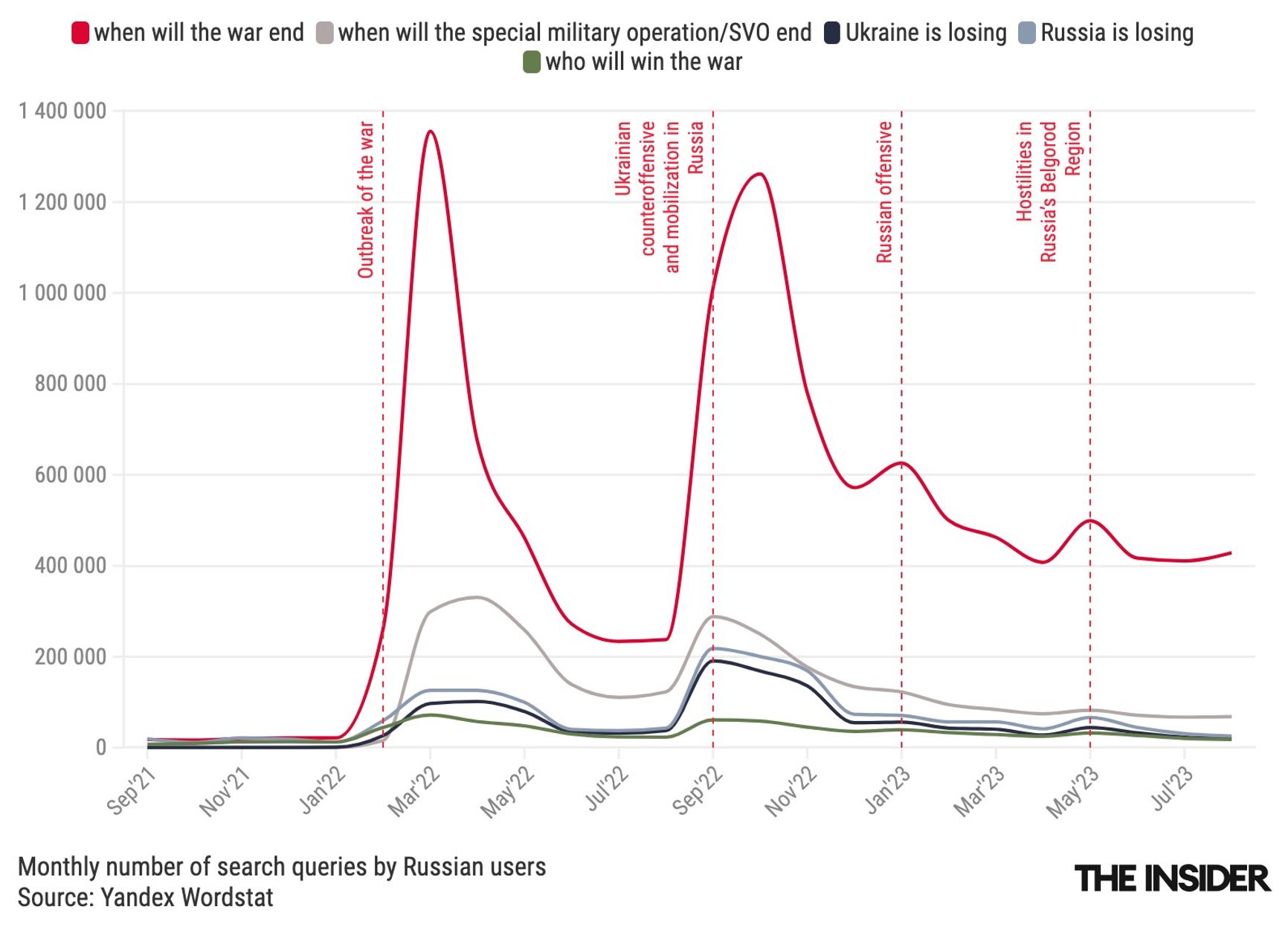
During the same periods, Russian residents also began to look up “who is losing” more often. Notably, users appear to be more interested in which country is losing than which one has more chances of victory. Such queries often involve the question of why one or the other side is losing.
The longer the war goes on, the more Yandex users are wondering about the prospects of a peace agreement and negotiations – even though experts are inclined to believe that a peace treaty between the two countries is currently impossible.
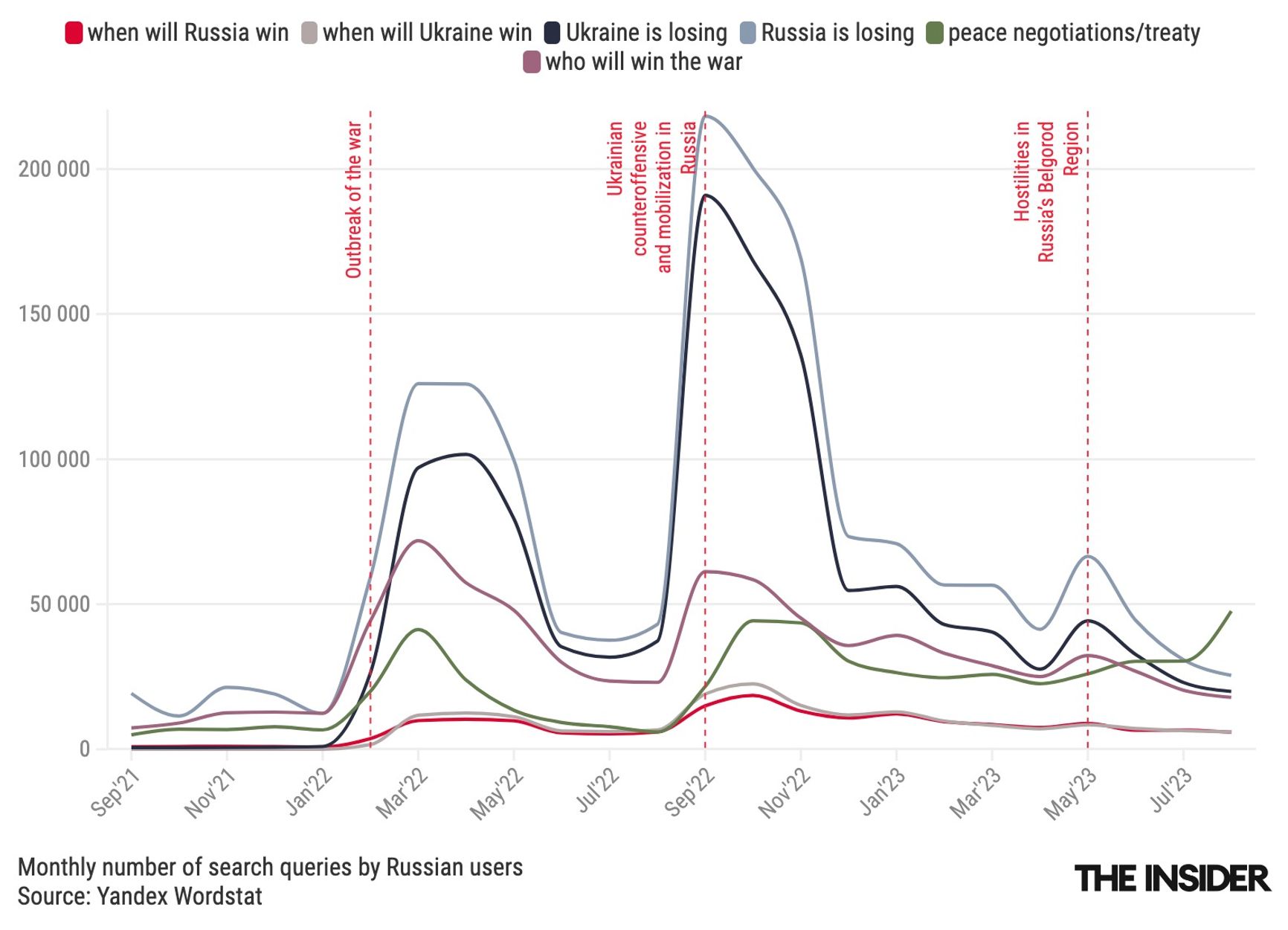
Demand for fortune-tellers and seers
More and more Russians are worried about their future, but the mistrust for official forecasts drives them to fortune-tellers, seers, and all sorts of charlatans (riding the wave of popular demand, propagandist TV hosts began inviting fortune-tellers to live broadcasts, where they stare into their crystal balls and see Ukraine crushed and Russia triumphant, defeating all of its global enemies). The popularity of all prediction-related queries grew manifold after the outbreak of the war. Russians hope to glean what will happen to Russia and Ukraine from the predictions of Bulgarian mystic Baba Vanga, deceased LDPR leader Vladimir Zhirinovsky, Russian 18th-century monk Abel, St. Matrona of Moscow, astrologers Tamara and Pavel Globa, Schema-Archimandrite Zosima, and prophet-cum-mathematician Sediq Afghan.
Meanwhile, television shows with psychics and astrologers remain the highest-rated in Russia and attract more and more viewers. The army appears to have developed a penchant for the supernatural as well.
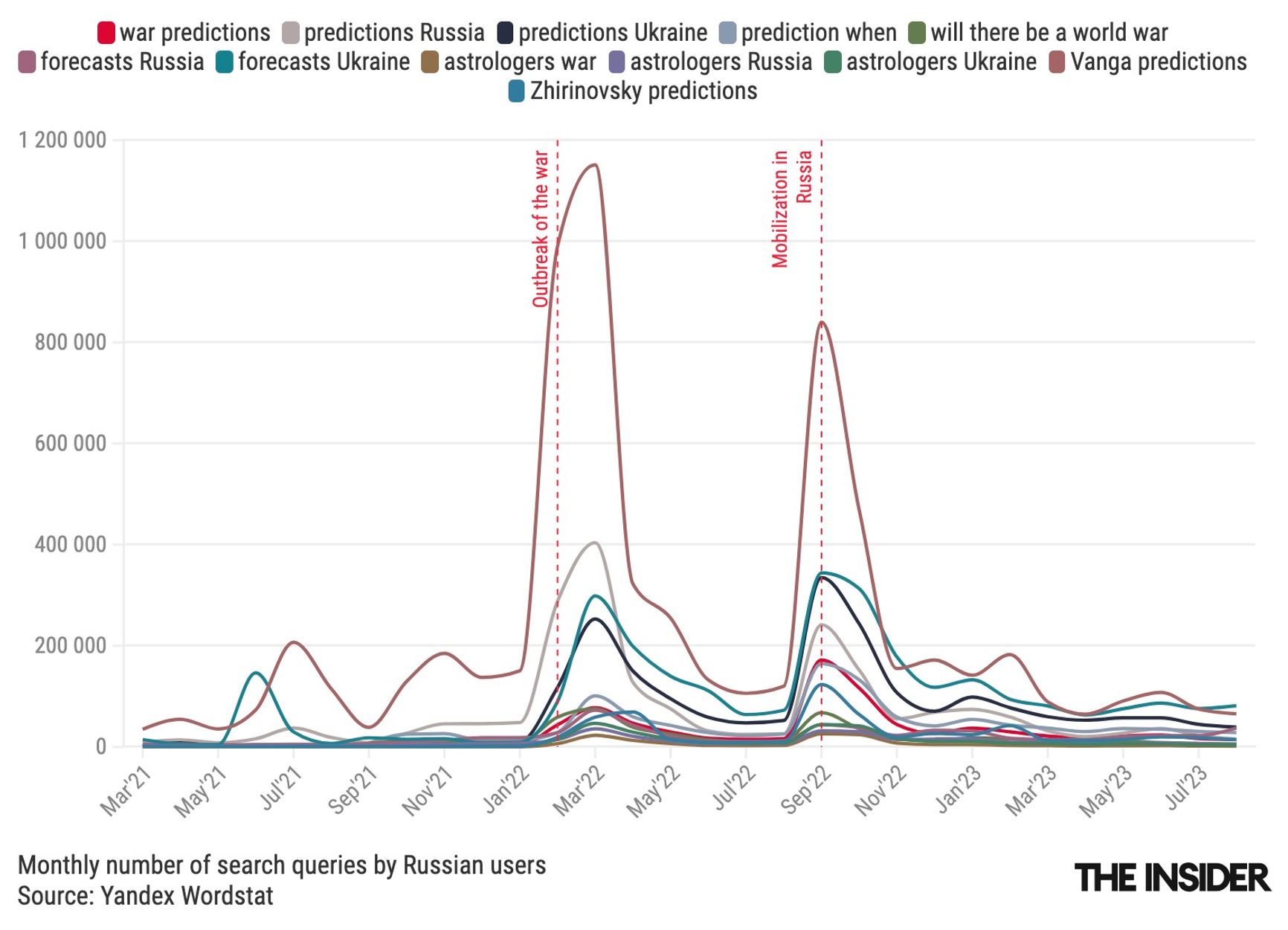
Fortune-tellers usually resort to the same trick Putin uses in his New Year's addresses, saying that we are facing an ordeal and that it’ll be difficult at first, but very soon it’ll get better, and we’ll overcome. Unlike Putin, soothsayers offer specific dates, such as “next spring” or “no later than next October” (when the deadline comes, no one remembers the old prediction and a new deadline can be set). For one, here’s how Tamara Globa puts it:
“June and the first half of July is an active time for cataclysms, military actions, and terrorist attacks. People will lash out against each other. Famine may affect the world, but not us. Humanity will unite. It's about a new standard of living. Political negotiations will show progress. But we won’t see the results until next spring or summer. A leading role awaits our country in the future.”
Drone attacks
Many Russians are unsettled by regular drone attacks on Russian territory. They have forced even apolitical Russians to take an interest in what’s going on.

In August and September 2023, Russian users looked up information about drones even more often than “war news” (a typical Yandex search query for updates from the front). However, the geography of interest in UAVs and shelling has not been homogeneous. Thus, 40% of drone-related queries in August and September came from Moscow and the Moscow Region, and another 20% from St. Petersburg, the Leningrad, Rostov, and Bryansk regions, Krasnodar Territory, and Russian-occupied Crimea. Similarly, the Bryansk Region accounts for 15% of all queries about “shelling,” with another 10% coming from the Belgorod Region.
The residents of annexed Crimea, Kursk, and Rostov regions are also curious to know more about shelling. Moreover, shelling is the hottest topic in the Bryansk and Belgorod regions, especially in Shebekino and Bryansk proper, according to Yandex's Regional Popularity Index. Meanwhile, drones are the most popular subject in Bryansk and the Moscow Region, especially Ramenskoye, Zhukovsky, and Lyubertsy.
Drones have become an effective way to draw attention to the war as a significant share of the population takes an interest in events only when directly affected, says political scientist Mindaugas Lapinskas, who conducted a sociological study on attitudes to the war in Russia:
“‘The indifferent’ are a highly elastic segment. We see that queries on relevant topics (successful Ukrainian operations last year or drone attacks on Russian territory) have shown a threefold growth in popularity. As long as the war doesn't affect people directly or there is no game-changing news, there are plenty of ‘indifferent’ people. But as soon as they hear the cannons or the roar of an IFV engine, their interest is immediately piqued. All of the Kremlin's efforts are directed at leveling out these surges. It's like in sci-fi movies: yesterday, there was a pothole in the road where a drone landed, and today, the road is smooth again. Nothing happened, it's all in your head – go live your life.”
Who attacked whom
Immediately after the outbreak of hostilities, a popular Russian query was “Why did they (or we) attack?”. Curiously, there was quite a bit of confusion as to who had attacked whom. Many people asked Yandex why Russia came under attack; others asked why Russia attacked Ukraine (with a ratio of approximately 50-50), and some even thought Russia was at war with NATO or that the alliance was preparing to attack.
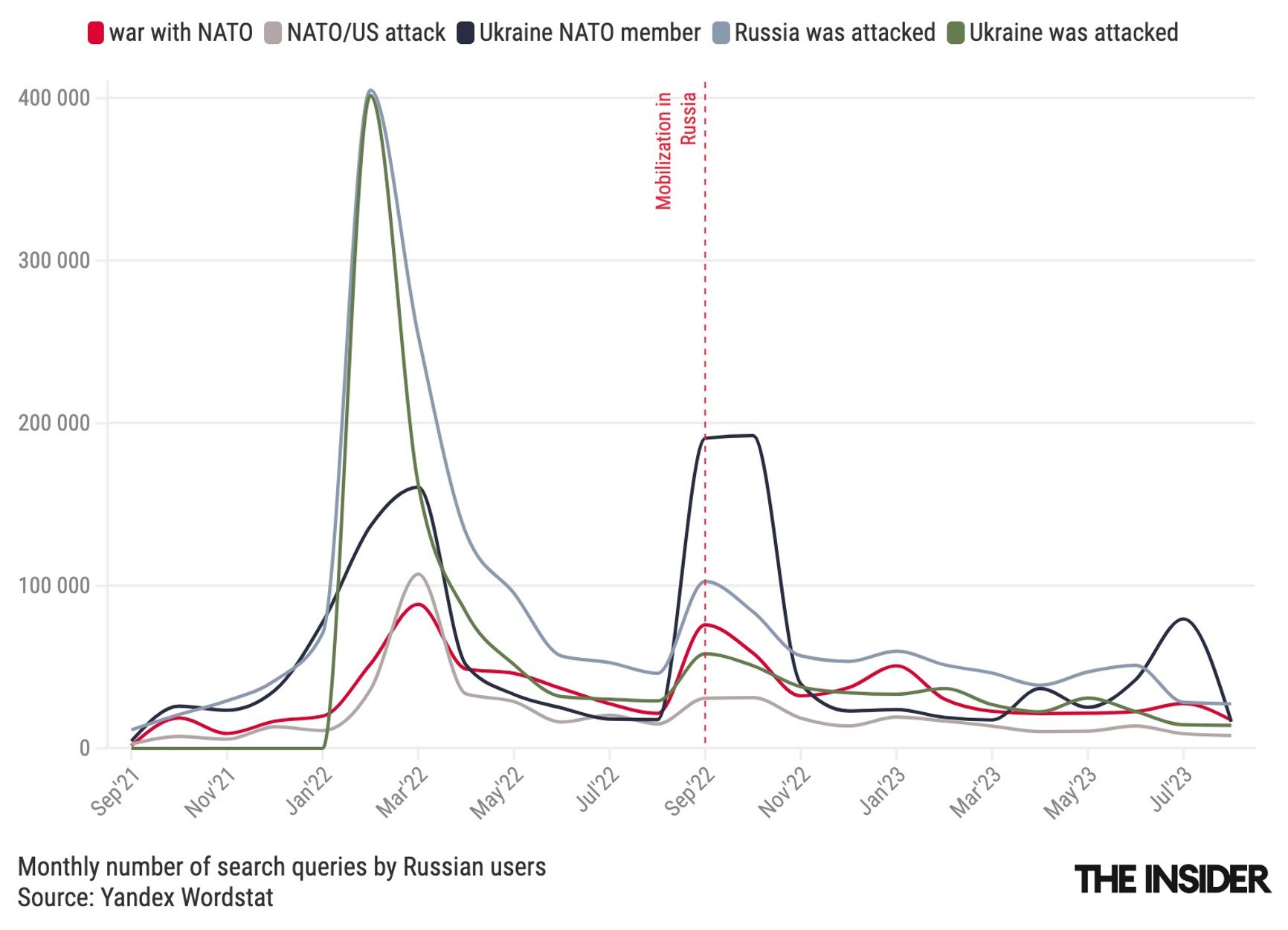
Russian propagandists frequently raised the topic of Ukraine's accession to NATO after the outbreak of the war, the announcement of mobilization, and the start of regular drone attacks and shelling on Russian territory. More and more Russians are looking for information about Ukraine's ties to NATO or its prospects of joining the alliance.
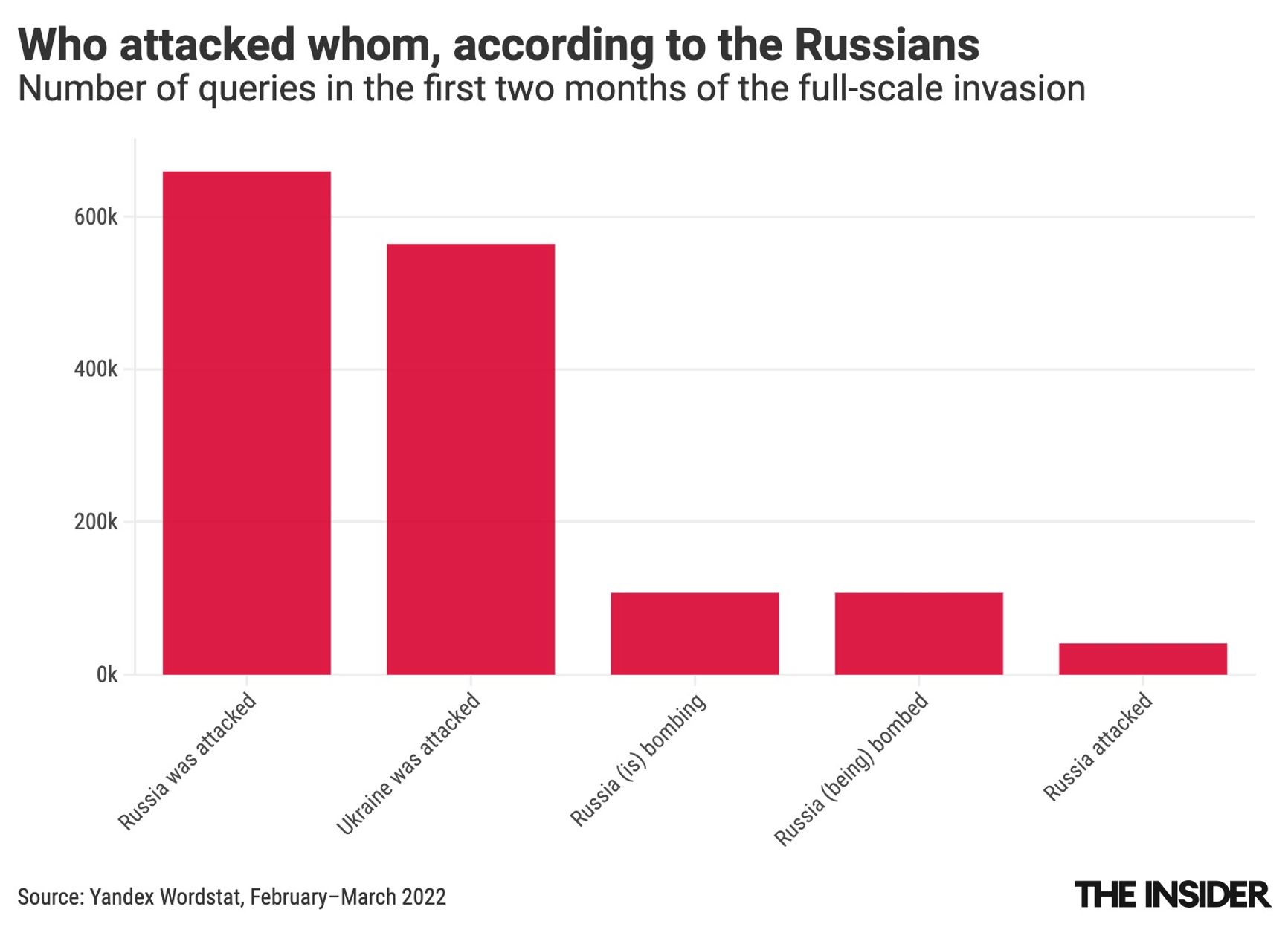
However, Mindaugas Lapinskas is convinced that all these queries were submitted by people seeking validation of their pre-existing position or curious to hear opposing arguments rather than those looking for actual answers:
“When we see statistics for queries like ‘who is the president of El Salvador’ or ‘how to remove a ketchup stain from a tailcoat,’ it's likely that people genuinely don't know the answer. They'll be satisfied with the first search result offered by the algorithm and probably won't return to the issue again. The war is a whole other story. People know about it and probably even know who attacked whom. So these statistics show their level of engagement, or rather, reflect a search for arguments that support their position or curiosity about the other side's arguments. I think such statistics prove the debate is still ongoing. You could say that the 'it’s-not-all-black-and-white' argument is finally playing the other way as well.”
According to Lapinskas, sociological studies show the absence of a clear enemy even among pro-war Russians. Since NATO and the “collective West” are vaguely defined enemies, the main terms Putin uses to explain to his supporters who Russia is fighting are “fascists” and “Nazis.” “And since it's a war on fascism, it doesn't matter if we were attacked or if we attacked first. The advantage of this approach for the Kremlin is the opportunity to claim at any given moment that fascism has been defeated, that it no longer exists, and we’ve won,” says the political scientist.
Army assistance and volunteer enlistment
Yandex search queries about helping the Russian military aren’t too popular. In terms of percentage, their share is very small, despite impressive absolute numbers: As The Insider estimates, at least 21,000 calls to «chip in” for a quadrocopter for the Russian army were published on VKontakte alone in the first nine months of the war.
Notably, whereas socially active Russians were looking for information on how to help refugees and Donbas when the war broke out, they switched their focus almost exclusively to helping the military in the following months, especially after Russia announced mobilization. Meanwhile, queries related to helping Ukrainians (as opposed to abstract “refugees” or Donbas) aren't popular anymore.

Nevertheless, Yandex users looking to enlist as volunteers and join the fighting are much less numerous than those willing to make a donation or help with logistics. Admittedly, similarly to calls for army assistance, Russians may respond to messages and announcements on social media, at military recruitment centers, or even on billboards. However, we believe that the proactive search we see in Yandex queries is also representative.
The highest frequency of queries along the lines of “how to become a volunteer” was registered after mobilization was announced. But again, the reasons extend beyond trivial patriotism. A volunteer's term of service is limited by their contract, whereas mobilized servicemen stay in the army indefinitely – until the war is over, or at least until their death or serious injury.
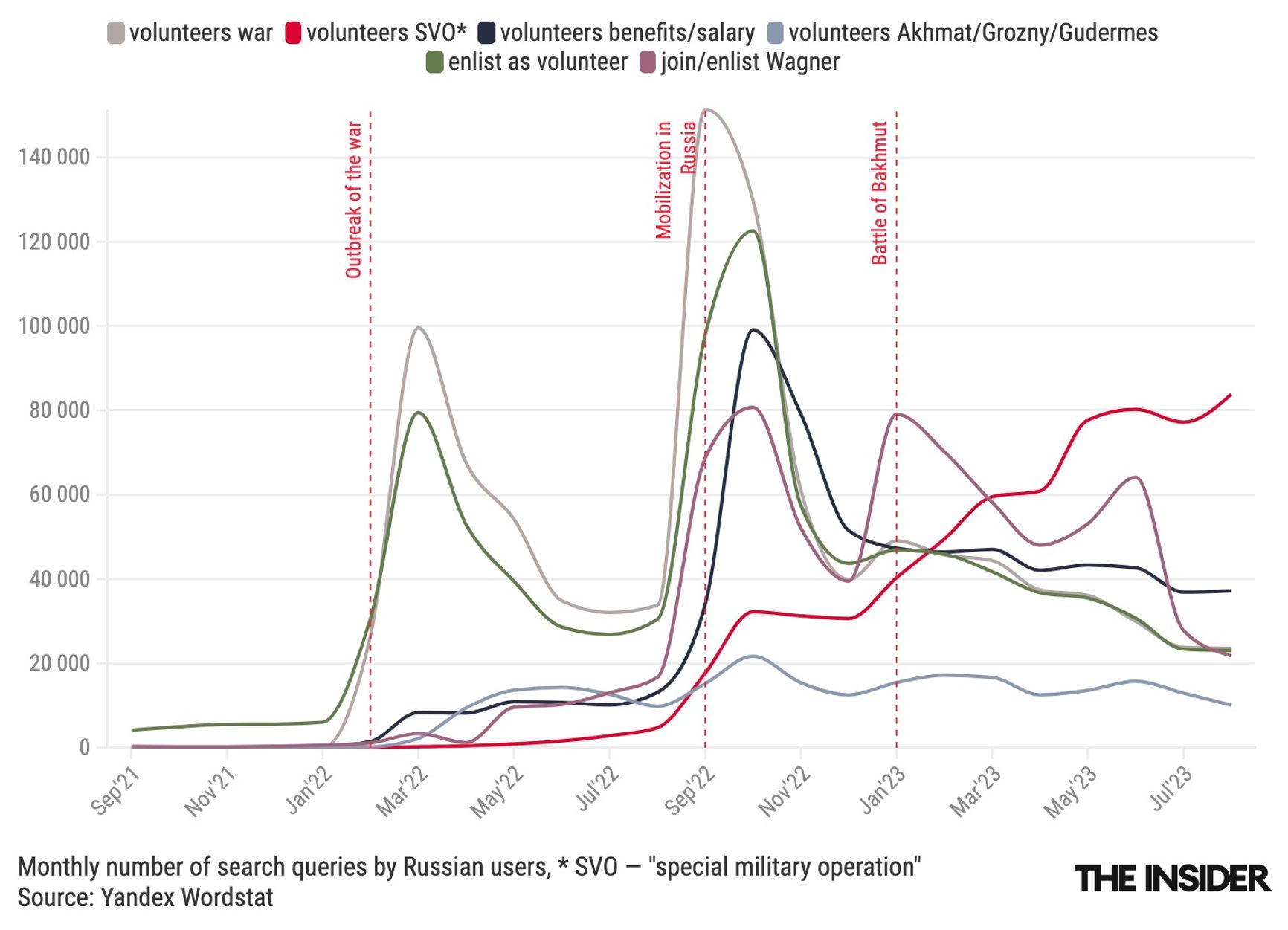
When searching for information about volunteer army units, Russians were mostly interested in what benefits and payments they would be entitled to and reviews of other volunteers. The same was true of the Wagner PMC until Prigozhin's mutiny in June and his death in August 2023. In September 2023, the majority of queries related to volunteer military service came from Tyva, Buryatia, Arkhangelsk Region, and Zabaykalsky Territory. Moreover, this topic was by far the most popular within these regions. Locals are interested in volunteer contract terms and conditions, availability of vacancies, and the procedure of enlistment.
Where did Putin go?
The most common types of Yandex queries related to the Russian president are encyclopedic information requests, memes, and his statements about current events. However, The Insider identified a few queries that surged in popularity during the key events of the war with Ukraine. The main question that periodically worries Russians is: “Where is Putin?” Russians were wondering where their president had gone when the war had just broken out, after Ukraine's counteroffensive, after the announcement of mobilization, during the Battle of Bakhmut, and when Western Russia and Moscow came under drone attacks.
A notable number of Yandex users also asked: “Why does Putin need Ukraine?” And after the mobilization began, more and more people started to wonder when Putin would leave and how long he’d been in power.

All of this illustrates that the Russian government's justification for attacking Ukraine does not fully resonate with the Russian nation.